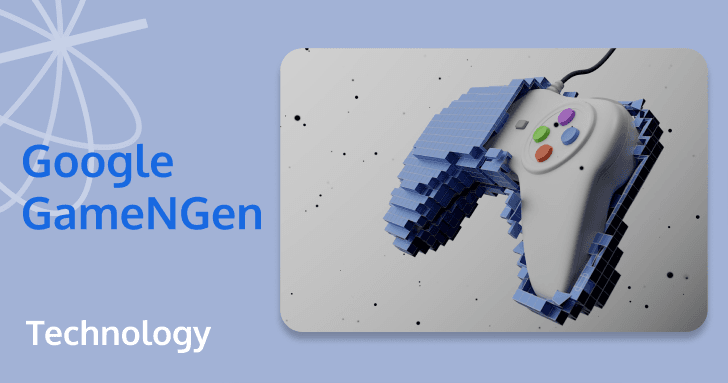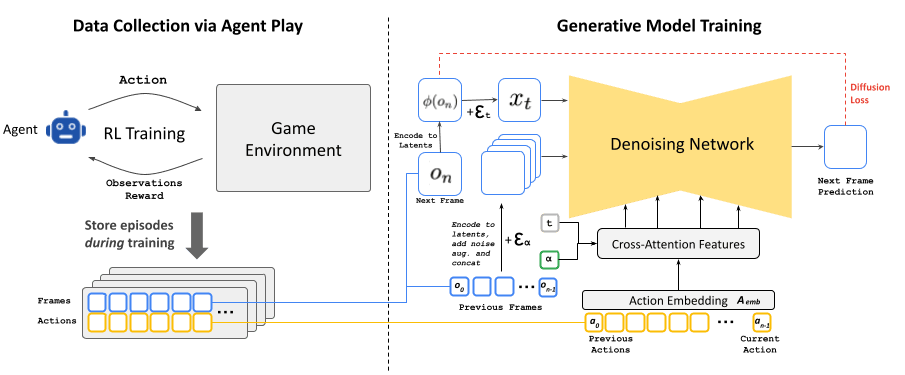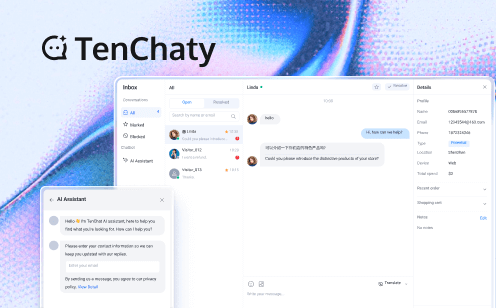
In a groundbreaking development, Google has introduced GameNGen, the world's first game engine entirely driven by neural models. This milestone in AI and gaming technology marks the beginning of a new era where games can be created and powered by artificial intelligence without any traditional coding. This AI game engine marks a significant advancement in zero-code game generation and neural model-driven game development.
Overview of GameNGen
GameNGen is a revolutionary AI game engine that can generate real-time, playable games without the need for conventional programming. Its key features include:
- Zero-code game generation
- Neural model-driven game engine architecture
- Real-time game rendering at 20 frames per second
The potential impact of this AI game engine on the $200 billion gaming industry is immense, as it could dramatically reduce development time and costs while democratizing game creation.
Technical Basis
GameNGen is the first AI game engine powered entirely by a neural model that enables real-time interaction with a complex environment over long trajectories at high quality.
The technical details are available in the research paper: https://gamengen.github.io/
 Revolutionizing Gaming: Google GameNGen, The World's First AI Game Engine
Revolutionizing Gaming: Google GameNGen, The World's First AI Game Engine
">
GameNGen Practice: Zero-Code Game Generation for DOOM
GameNGen's DOOM simulation demonstrates the power of AI in game development. The emergence of GameNGen marks a major breakthrough for AI in the field of game simulation, enabling for the first time a full simulation of the video game Doom, with its high-quality graphics and complex interactions, without the need to write code.
Since its release in 1993, Doom has become a benchmark for measuring technological advancement with its exceptional first-person shooter experience and legacy. However, the introduction of GameNGen has certainly taken these early attempts at innovation to a new level.
While traditional game engines rely on carefully coded software to manage game state and render visuals, GameNGen employs an AI-driven generative diffusion model that automatically simulates the entire game environment without relying on the usual components of a game engine. This not only dramatically reduces the time and cost of game development but also has the potential to put the power of game creation in the hands of a much wider group of people, enabling them to create complex interactive experiences like never before.
GameNGen's simulation quality for DOOM
The quality of GameNGen's simulation is exceptional, reproducing images and videos from Doom games with a high degree of realism.
- Image Quality: GameNGen's AI game engine generates images that are virtually indistinguishable from the original game. It is able to maintain a similar image quality to the original game during long gameplay sessions.
- Realism: The AI-generated game images are so realistic that it is difficult for people to distinguish whether it is an AI simulation or the real game's images during short time clips.
- Evaluation metrics: Two specialized metrics, LPIPS and PSNR, were used to assess image quality. These metrics demonstrate GameNGen's capability in zero-code game generation of DOOM. In testing, GameNGen achieved an average of 29.43 PSNR and 0.249 LPIPS across 2048 different level tracks, which demonstrates its high-quality image output.
- Video Quality: Although there are small differences between simulated and real gameplay videos in long-time autoregressive generation, these differences are mainly due to the accumulation of small speed differences between frames.
- Human evaluation: In a test with 10 evaluators, they watched 130 game clips of 1.6 and 3.2 seconds in length. The results showed that the evaluators considered the AI-generated gameplay clips to be realistic in 58% to 60% of the cases, further proving the quality of GameNGen's simulation.
The Future and Challenges of GameNGen
The introduction of GameNGen marks a paradigm shift in game development. This neural model-driven approach to game development opens up new possibilities for zero-code game generation. In this new AI-powered era, games are no longer limited by the lines of code programmers knock down, but are defined by the weights of neural network models. This means that game developers can quickly create entirely new game experiences with simple instructions or sample images.
GameNGen's potential is not limited to reshaping the gaming industry; its applications span a wide range of fields such as virtual reality, self-driving cars, and smart cities. In these fields, real-time simulation is key to training, testing, and operations management.
Although GameNGen shows great potential, it also faces a number of challenges. Developing a general AI game engine capable of running a wide range of games, from DOOM simulations to modern titles, remains a challenge. In addition, for more graphically intensive games, GameNGen may require more computing power to support. However, these challenges are also driving the technology forward.
Why Choose Tencent RTC for Conversational AI?
Looking to build a powerful, no-code AI Voice Assistant? Tencent RTC is your ultimate solution! With its unmatched versatility, ease of use, and cutting-edge features, Tencent RTC makes implementing Conversational AI a breeze. Here’s why it stands out:
1. Seamless Integration with Multiple AI Services
Tencent RTC supports integration with a wide range of STT, LLM, and TTS providers, including Azure, Deepgram, OpenAI, DeepSeek, Minimax, Claude, Cartesia, Elevenlabs and more. This flexibility allows you to choose the best services for your specific use case. When the LLM provider chooses OpenAI, any LLM model that provides OpenAI-compatible API endpoints is supported here, including Claude and Google Gemini.
2. No-Code Configuration
Tencent RTC simplifies the setup process with a user-friendly interface, enabling you to Configure Conversational AI in just a few minutes. No extensive coding knowledge is required, making it accessible to everyone.
3. Real-Time Interruption Support
Users can interrupt the AI's response at any time, enhancing the fluidity and naturalness of conversations.
4. Advanced Features
AI Noise Suppression: Ensures clear audio input, even in noisy environments.
Latency Monitoring: Tracks real-time performance to optimize conversation flow, including LLM latency and TTS latency.
Switch Providers on the Fly: Without ending the conversation, you can modify the interruption duration, or switch between different LLM and TTS providers (and voice IDs) to experiment with various configurations.
5. Multi-Platform Integration
If you like, Tencent RTC also supports local development and deployment across Web, iOS, and Android platforms, providing flexibility for diverse applications
Ready to see it in action? Watch this video or follow the tutorial to start building your AI Voice Assistant today!
Tencent RTC In-game Voice Chat with GME SDK
The Tencent RTC In-Game Voice SDK is a cutting-edge solution designed to revolutionize player interaction in gaming environments. With a focus on enhancing user experience and social engagement, this SDK integrates seamlessly across multiple platforms and game genres.
Key Features
- 3D Positional Voice Chat: Utilizing advanced spatial audio technology, the SDK delivers a virtual stereo sound and a 3D immersive experience, allowing players to perceive the distances and positions of in-game characters.
- AI-Powered Noise Cancellation: Minimizes background noise to ensure clear and crisp voice communication, enhancing the overall gaming experience.
- Proximity Voice Chat: Enables communication based on in-game proximity, fostering realistic interactions and bringing the virtual world to life.
- Voice Control: Offers players the ability to mute, manage volume, and select who hears their voice, providing a customizable gaming experience.
- Unlimited Co-anchors: Supports an unlimited number of users co-anchoring in a single room without restrictions, accommodating large-scale gaming events.
- Effortless Communication: Features like text-to-speech, speech-to-text, and text translation elevate the convenience of the gaming experience.
- Cross-Platform Connectivity: Ensures real-time engagement with players on various platforms, including PC, console, or mobile.
- Global Deployment: With service in over 200 countries and regions and an average end-to-end latency of less than 300 ms, the SDK is optimized for global use and GDPR compliant.
- Platform and Engine Support: The SDK is compatible with a wide range of engines and platforms, including iOS, Android, Windows, macOS, webGL, Linux, Unity, Unreal, and Cocos, ensuring a smooth voice chat experience across all devices.
Performance Metrics
- 3 Billion Minutes: Of audio published daily, showcasing the SDK's extensive usage.
- 6,000+ Developers: Trust the SDK for their game development needs, highlighting its reliability and quality.
Use Cases
- Esports Games: Supports real-time voice chat for competitive gaming scenarios.
- Party Games: Enhances interactive features in social gaming experiences.
- MMO/Sandbox Games: Provides immersive spatial audio in expansive gaming worlds.
- VR/AR Games: Facilitates natural communication in virtual and augmented reality environments.
Conclusion
The Tencent RTC In-Game Voice SDK is a comprehensive tool that significantly boosts player engagement and social interaction within games. It is the go-to solution for developers seeking to integrate high-quality, immersive voice communication into their gaming projects.
Conclusion
In conclusion, Google's GameNGen represents a significant leap forward in AI-powered game development. As this neural model-driven AI game engine evolves, it could reshape not only the gaming industry but also impact fields like virtual reality, autonomous vehicles, and smart cities. By leveraging zero-code game generation and advanced neural models, GameNGen is paving the way for a future where AI's capabilities drive our virtual experiences, from DOOM simulations to entirely new game concepts.
If you have any questions or need assistance online, our support team is always ready to help. Please feel free to Contact us or join us on Telegram or Discord. For technical problems, you can also get help directly from developers on Stack Overflow.


